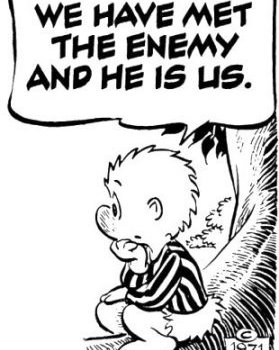
We all see messes and problems in the world that we don’t like and want to go away. Companies losing money, teachers on strike, government shutdowns that seem unnecessary. We gain and seek information on the messes and their cause, we form our opinions, we start to voice those opinions in small or in big ways, depending on our motivations
But when it comes to messes, all kinds, there is one step to take before seeking external information so we can form our opinions. It is asking yourself a simple but profound question—“how have I contributed to the making of this mess? What have I don’t to create the world I am complaining about? What have I done to keep teachers salaries so low in some places? How did I not step up at my company now that I find it losing money? How did my non-action lead to a government shutdown that seemed to hurt so many and could happen again?
This is a hard approach. “Surely”, you will ask, “I don’t have to take any blame for messes that happen far from me and whose causes I am not even aware of.” And that is fair, and the answer is of course not. But in a time when we are quick to blame others and to find something we don’t like so we can condemn it within seconds(seems as though several million of us on social media act blindingly, massively quick), shouldn’t we slow down just a bit. We may want to readily despair at our opponents’ motivations as much more self-serving than our own, but is it better to have another reflex that will slow us down and help us do the Pogo move for responsibility?. (“We have met the enemy and he is us!” https://en.wikipedia.org/wiki/Pogo_(comic_strip), from early Oct, 1948—no I wasn’t born yet either, at least not quite yet.)
To stick with a business example. I have coached business leaders who do not get this truth of stepping up to responsibility, and it is always to their and their company’s detriment. Coaches and consultants hear things like this from leaders, not quite so blatantly, but to similar effect: “How can I fix those people out there in my business?” when the company does not execute the plan they have put in place. A better question to start with, before any “fixing of others”, is how can I alter my leadership approach and values to set a culture in motion where my employees, especially the moderately talented ones, not just the superstars, can contribute and thrive.
When leaders get this question, and take it to heart, that is when things start to change. Let’s stop complaining first, as employees, leaders, and citizens—apparently this does not fix much even though if often feels pretty good.
Pogo offered us a useful statement in 1948. It still holds today. We have messes we have to address. Let’s start with a look inside.
